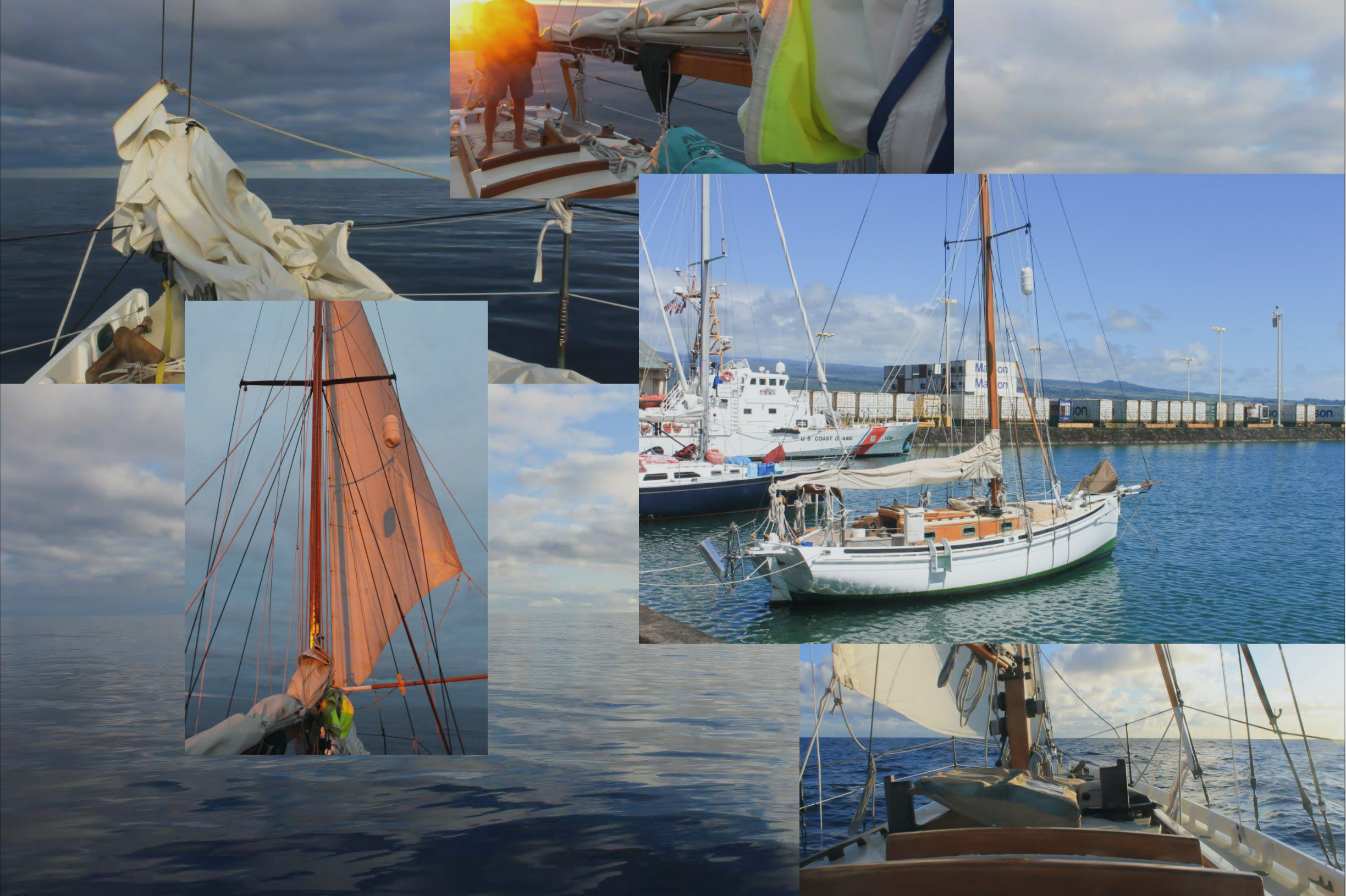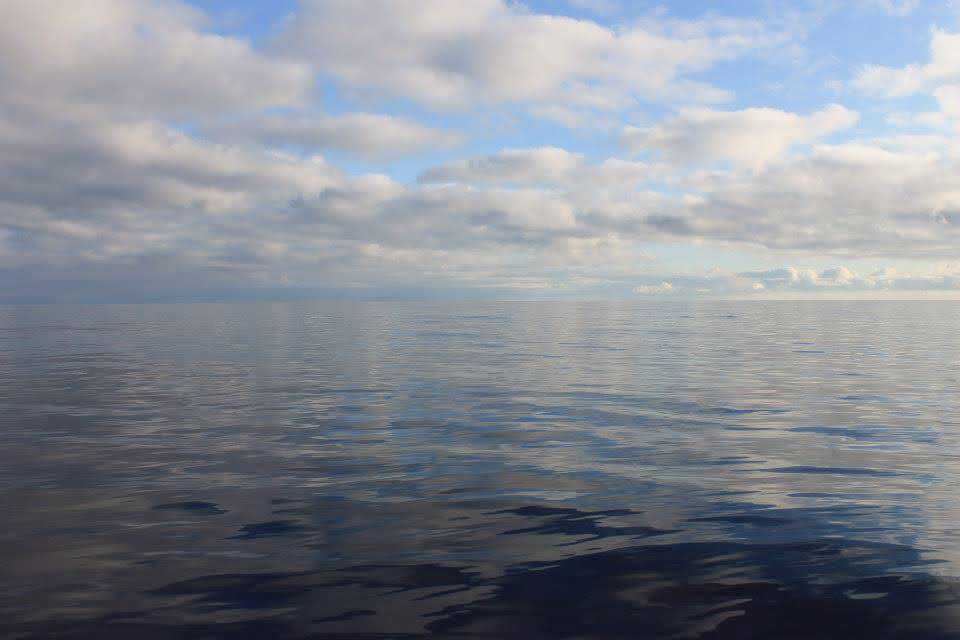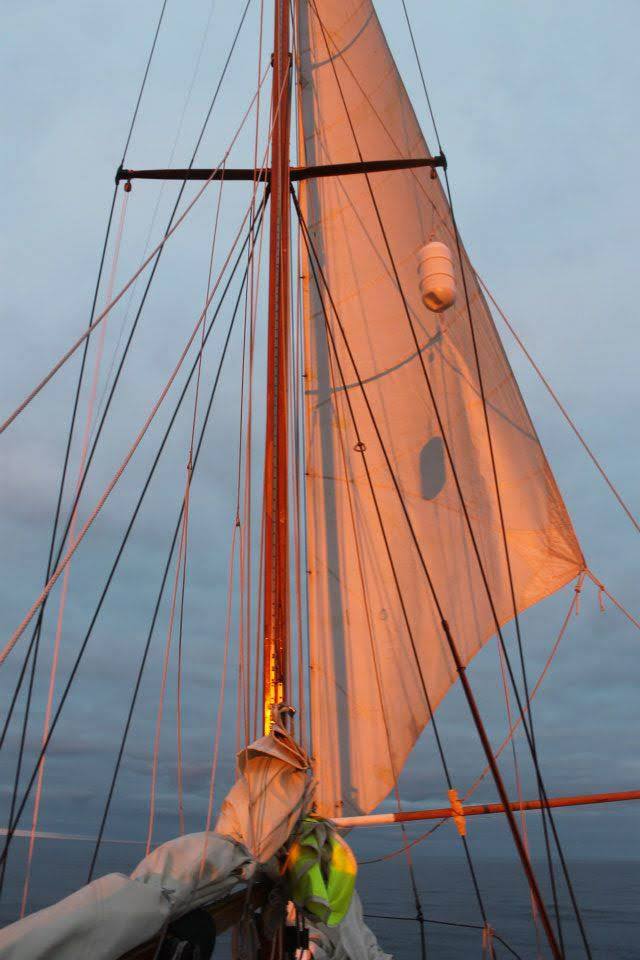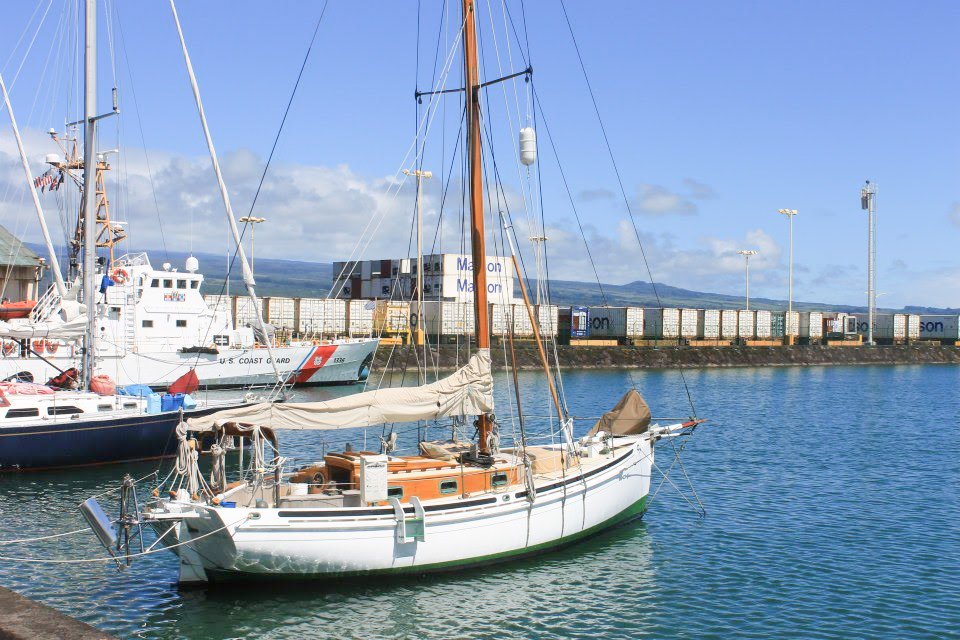Landsick

Landsick
By Emma Hayward
Fresh, hot water runs down my scalp, over my face, and drenches my body below. Grey and white wall tiles in the free marina shower slant in a steady rhythm, this way and that. Reaching my left hand out, I attempt to brace myself against the moving wall, and now the cement underfoot is bobbing too. My stomach is thinking about coiling up in illness and I beg it not to do so. I am standing on dry earth for the first time in forty days, and I am landsick.
I am standing on dry earth for the first time in forty days, and I am landsick.
I’d held my breath as I stood on the dock in San Diego. I was just one step away from the deck of Skye, and it was the furthest I had been from the floating safety of our sailboat since setting out from Hilo, Hawaii with my father over a month ago.
I stumbled up the dock, mesmerized by the human activity going on around me: Business people eating lunch on a bench, tourists posing for photos, landscapers trimming a hedge. The past few days and the past fifty miles had been like this, too. The space of water and air just outside of San Diego—so clogged with human life—was difficult to approach after four thousand nautical miles of open ocean.

Blue on blue and clouds reflected in the Pacific.
The Pacific Ocean is a gigantic place and large ships stick to their designated shipping routes. There are not as many small sailboats, and even if there were, the likelihood of encountering each other was remote.
Our sailboat, Skye, made her way slowly from one shore to the other. As a 32ft Bristol Channel Cutter built of wood, Skye was a true sailboat; she lacked an engine. A straight shot from Hilo to San Diego could be as quick as 21 days, but this summer the North Pacific High Pressure System was big and hungry.
In the center of any high pressure system is nothing. No wind. Only calm. We sailed north in hopes of finding the top of the system, then riding its westerly winds east to San Diego. Instead, the system found us. It squatted over us for days, weeks. Skye floated helpless, occasionally rocking from side to side in the lulling Pacific swell. Progress became little to none. Ten, twelve, eighteen hours of sailing at a time, and then the calm would catch us again. The ocean was so flat I considered walking home.
 Our only sightings had been of a few cargo ships. They sat far away on the horizon, bobbing silently like a child’s toy. In reality, the ships were monstrous in size and probably never noticed our tiny mast miles away. Despite their ignorance to my existence, I basked in their unwitting company.
Our only sightings had been of a few cargo ships. They sat far away on the horizon, bobbing silently like a child’s toy. In reality, the ships were monstrous in size and probably never noticed our tiny mast miles away. Despite their ignorance to my existence, I basked in their unwitting company.
At sea, the ocean was all I could hear, all I could look at, all I could smell, all I could feel.
At sea, the ocean was all I could hear, all I could look at, all I could smell, all I could feel. The blue of the water and the blue of the sky were no longer beautiful—they just were. My mind’s eye ached for the lushness of the shore, for trees, and dirt.
My father took the first watch one evening, and woke me for mine four hours later. I was still opening my eyes as I climbed up the companion-way and clipped my harness to an eyehole in the cockpit. My father was sitting on deck, eyes straight ahead.
“Do you see that, Emma?” he asked, not taking his eyes off whatever he was looking at. Up ahead, very far off, was a significant glow on the horizon. I was completely mystified.
“Is it dawn?”
“No. It’s Los Angeles.”
So the ocean too, has edges.
During the days that followed, we were exposed to more human activity then we’d witnessed in the previous month. Our VHF radio was hectic with the arguments of stubborn fishermen and authoritative Coast Guard. Our jaws dropped in awe as Naval ships so monstrous their crews appeared as plastic figurines passed by us. Submarines dove below us as helicopters darted above. We were enchanted as a whale, three times the size of our boat, swam by and took a tremendous breath before descending down, down, down into the depths. For the first time in weeks we watched a sunset obstructed by land, the rich oranges and reds glowing just above Catalina Island.
So the ocean too, has edges.
As hungry as I had been for green, I now mourned for what I was losing. Far from land my stars had not been obstructed by the pollution of light, and my thoughts had not been tangled by the frenzy of others.
I wondered if our last moments at sea were more challenging than all the others. The open ocean is vast, the land that besieges it is unforgiving. Coming into the harbor, heading for the marina, guiding Skye into a slip under only the power of sail.
“Go… NOW!” My father shouted from the helm as I flew from the deck, line in hand, and raced to whip it around the nearest cleat. My feet slammed onto the dock, I secured our line, and in such a sudden instant, we were land-bound once again.

Skye tethered in the San Diego marina.
Stepping from the dock onto hard land felt like an unceremonious end to a substantial voyage. I stood on drying grass where dock met yard, and glanced back to my father on the deck of our vessel. He was puttering about the bow, already preparing Skye for downtime. Was he one hundred yards away? That’s farther than we had been from one another in forty days.
Trodding carefully up to the bathrooms, I made note of every terrestrial life form I saw. Landscaped flowers skirted the pathway, forest birds chirped overhead, and insects launched themselves across the lawn beside me. I found a vending machine and my taste buds ached for something chilled. I grabbed a dollar and some coins from my pocket, money, which now felt foreign and meaningless after so much time spent in a place uninformed of material wealth.
Downing my delightfully cold drink, I pushed open the door to the marina bathrooms. In the mirror I was met by a girl in leathered skin with a rat’s nest for a hairdo, encrusted in salt from her head to her toes.
I turned on the shower and marveled at the abundance of clean, fresh water. Bottle of Dawn in hand, I stepped into the steaming shower and exhaling, closed my eyes.
Having grown accustomed to correcting the constant movement seen by my eyes, my brain has not yet realized that where I am standing now is still.
And when I open them the world is bobbing. Up and down, the walls around me heave to and fro. It is a steady lilting, not unlike the sea. Having grown accustomed to correcting the constant movement seen by my eyes, my brain has not yet realized that where I am standing now is still.
To feel motion sick, or lack-of-motion sick, proves that my being has shifted from ocean to land. Physically, I am ashore, but my brain has not yet caught up, and I wonder if my emotional being will lag behind too.
Now that I am back where it is still, back under light-infected skies, back to a place bursting with green, there’s no longer the need to compensate for motion, no longer every star in the sky, no longer the inescapable blue. This terrestrial being is back on dry land.
Emma Hayward grew up on Cape Cod in Massachusetts and is currently spending her summer sailing in Newport, Rhode Island.
Be the first to comment